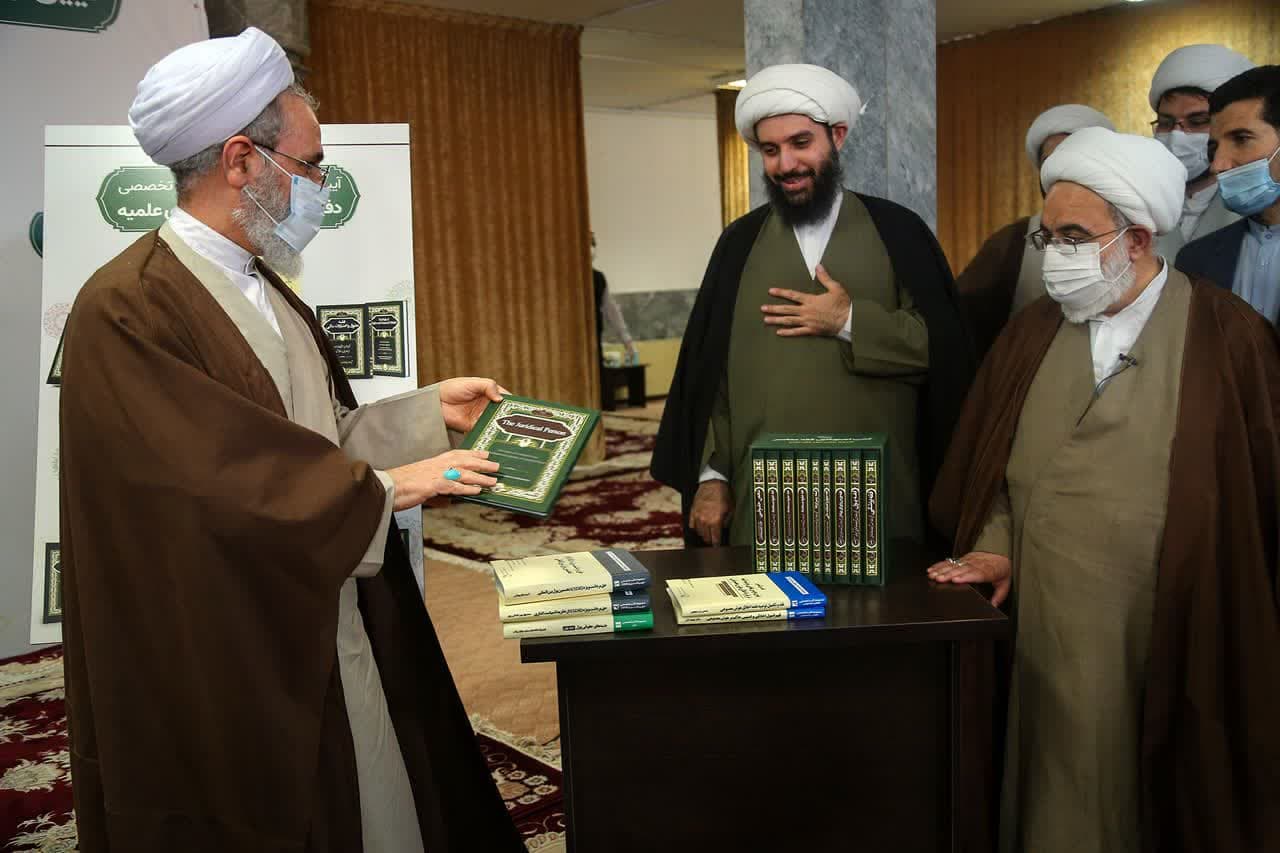23 Jul 2025
۰ Comment
( 12 )
Progress in Islamic Legal Thought; Achievements and Plans
Head of Contemporary Jurisprudence Office, Hojjatoleslam Hosein Ethna-Ashari, unveiled the achievements and plans of the office.
During the unveiling of newly published advanced jurisprudence volumes by the Office of Contemporary Jurisprudence, Hojjatoleslam Hosein Ethna-Ashari highlighted several major developments:
Achievements:
- Five key volumes on Islamic Legal Theory—including Al-Fāiq fī Al-Usūl, Al-Rāid fī Al-Usūl, and a related commentary—were compiled and taught in 240 classrooms across the country, reaching 5,000 students over the past two years;
- Authoring the book entitled “A Legal Entity” and making a start on teaching this book on a trial basis;
- Formation of 8 research groups with the cooperation of university professors in the fields of economics, fundamental rights, human rights, legal procedure, social media, artificial intelligence, and cryptocurrencies;
- Cooperation with the jurists of the Islamic Seminary and launching advanced jurisprudential lessons in the subjects of cryptocurrencies, money, stock exchange, and capital market, judicial law, legislative jurisprudence, and legal entity;
- Compilation and publication of 9 volumes of books out of the lessons of contemporary jurisprudence;
- A collaborative platform was developed with Islamic Seminary departments for professors and students to promote advanced jurisprudential studies in contemporary jurisprudence. This initiative led to a record-breaking academic year (2022–2023), with 50 courses and over 3,400 participants, making it the most attended and most offered subject area in advanced jurisprudence—representing nearly 45% of all enrolled students.
- Announcement of more than 200 topics for level 3 and 4 theses related to the topics that were taught.
- Four books were compiled covering key topics: SDRs as the first international currency, legal perspectives on money, and AI ethics. These works will be distributed to seminary teachers and presented with published critical reviews and appropriate academic titles—similar to how the late Kashif al-Ghita’s Tahrīr al-Majala was introduced—for inclusion in curriculum at Islamic Seminaries and universities.
- Formation of specialized working groups to review international and domestic documents and laws.
- Compilation of a single-volume critique addressing UNESCO’s draft recommendations on AI ethics. Developed with input from experts in jurisprudence, ethics, philosophy, and law, the work was submitted to Iran’s UNESCO negotiation team and is slated for expansion into two comprehensive volumes for future publication.
- Establishment of “Ijtihād to University” network to convert scholarly work from Islamic jurists into accessible academic articles. This effort successfully led to the publication of its first paper—on cryptocurrencies—in the Monetary and Banking Journal of Iran's Central Bank Research Institute, marking a breakthrough in bridging traditional jurisprudence and modern academic discourse.
Future Plans
- Introducing 8 foundational courses in contemporary jurisprudence, featuring 19 key titles including A Bank with Usury, Sovereignty in Islam, and other topical studies;
- Planning the compilation of 7 new volumes covering advanced jurisprudential issues on contemporary subjects, scheduled for release in the upcoming academic year;
- Officially launching the course titled "The Legal Entity" as part of contemporary jurisprudence, designed to complement the foundational text Makāsib;
- Preparing to publish at least five specialized volumes, each accompanied by scholarly critique from seminary experts, on pivotal subjects including venture capital, monetary law, AI ethics, and separation of powers;
- Producing an "Ijtihad Roundtable" program, a thought-provoking broadcast featuring seminarian jurists discussing key issues in jurisprudence and Islamic Legal Theory;
- Undertaking the translation of Islamic Seminary educational materials into global languages to enrich and contribute to the international academic literature;
In continuation, pictures related to the unveiling ceremony of the books of advanced jurisprudence have been uploaded:



Similar news
There is no data
Comments
0 Comment
Time
Support email :
All rights are reserved for the website of the Department of Contemporary Jurisprudence, Islamic Seminary - Iran - Copyright@2025
